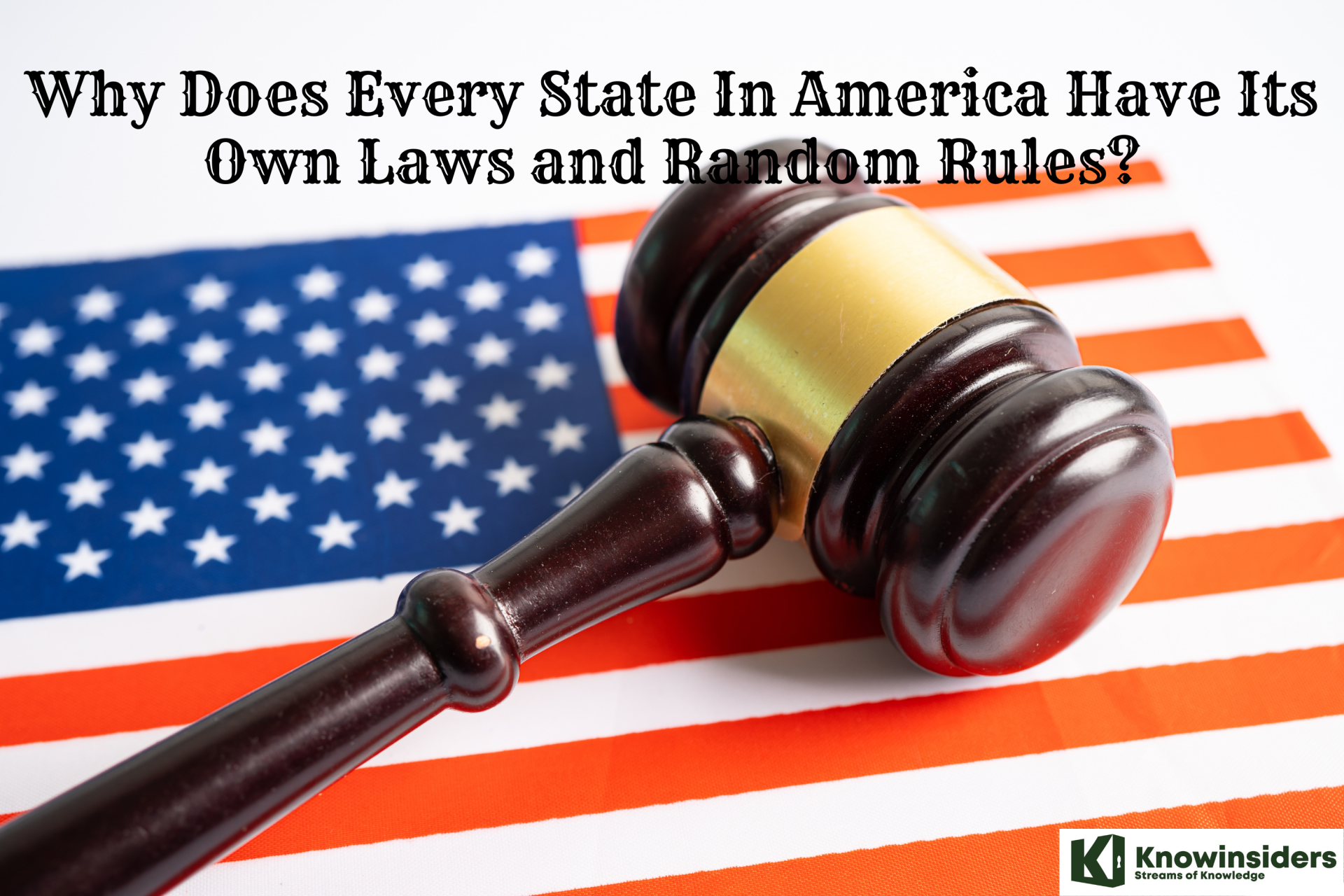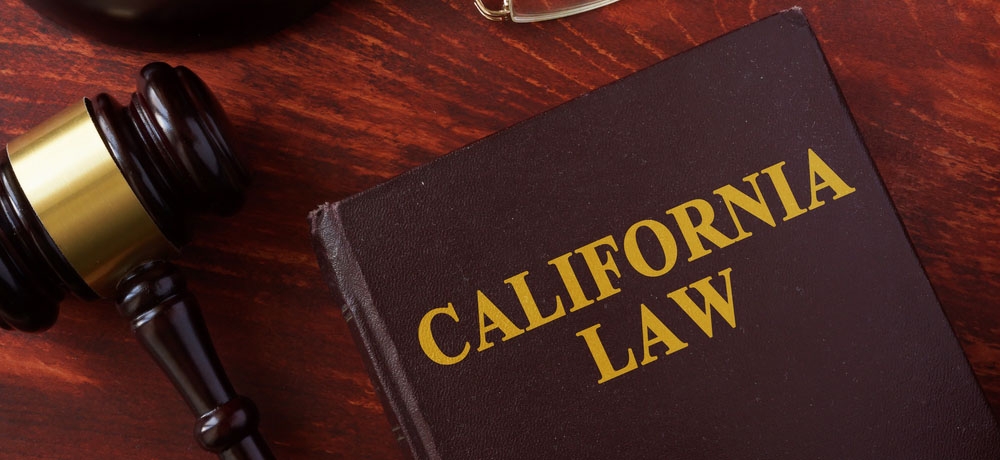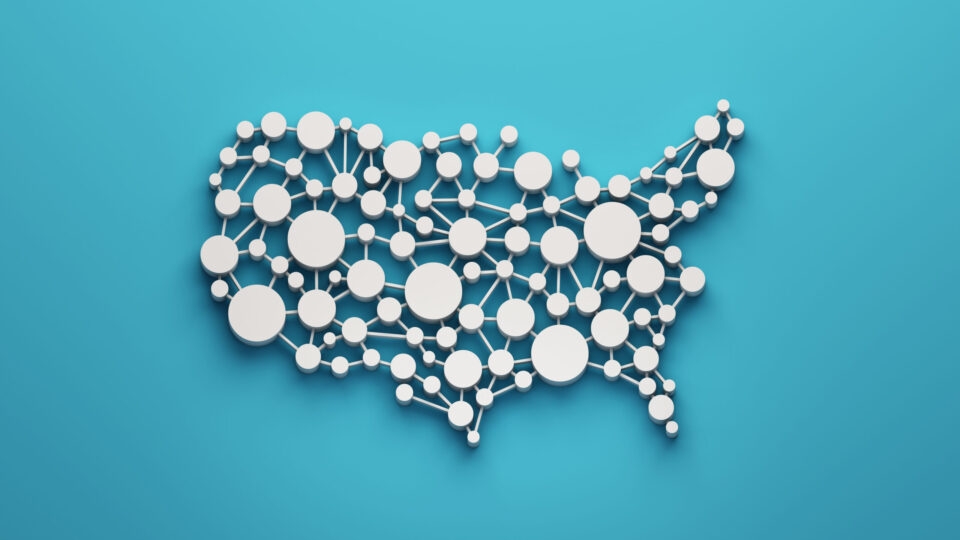What are the Differences Between State Laws and Federal Laws in the U.S
 Top 20 Craziest Laws in the US That Still Exist Today Top 20 Craziest Laws in the US That Still Exist Today |
 Top 13 Craziest and Dumbest Laws in the US Today Top 13 Craziest and Dumbest Laws in the US Today |
 |
| Why Does Every State In America Have Its Own Laws and Random Rules? |
| Table of Content |
The State and local governments are the ones that most Americans interact with more frequently than the federal government. Typically, State and local governments are in charge of managing police forces, libraries, and educational institutions—not to mention issuing licenses and parking tickets.
Every state has a written constitution, and these texts frequently differ significantly from the federal one in complexity. For instance, the Alabama Constitution is 310,296 words long, more than 40 times longer than the United States Constitution.
All-State governments have three branches: the executive, legislative, and judicial, and are modeled after the federal government. The three-branch structure is not required, but the U.S. Constitution requires that all states maintain a "republican form" of government.
A similar procedure is followed by state law, but at the state level. Bills are drafted by state legislatures, approved by the governor, and then become law. These laws may be examined by state courts, who may then decide to repeal them if they find that they conflict with the state's constitution.
Distinctive Features of the American Legal System
Due to the unique characteristics of American society at the time, it was necessary for it to adhere to its own laws based on the Bible.
How the American legal system has evolved There were 13 British colonies in North America when the British first arrived there in the 17th century, but at the time British law was inapplicable to the country's conditions and circumstances. Due to the unique characteristics of American society at the time, it was necessary for it to adhere to its own laws based on the Bible.
British law and American law split apart after the US gained independence in 1776, creating two separate legal systems. The US legal system is both relatively stable (based on the US Constitution) and has a regulatory nature. While the British legal system is a unitary one and the American legal system is a federal one with flexible adjustment (based on case law), these two legal systems still share a common foundation in that American law continues to draw on the ideas, justifications, theories, and legal sources of English law.
The US Constitution (1787), the first written constitution in world constitutional history and the oldest still in effect, is the primary source of law in America. The US Constitution serves as the cornerstone of American law, not just for ceremonial purposes.
On the basis of the federal constitution, the states of the United States have also drafted and adopted their own constitutions. State law is inferior to federal law, but in practice, the states hold the majority of the legislative power. Due to the fact that states frequently refer to the laws of other states when drafting their own legal documents and frequently do not enact laws, the US has 50 states, which correspond to 50 different legal systems. The laws are too dissimilar.
Federal courts and state courts make up the American judicial system. The federal supreme court, the federal court of appeals, and the federal courts are examples of ordinary federal courts. Specialized federal courts include tax courts, appeals courts, and international commercial courts. The Supreme Court, the Court of Appeals, and the Court of First Instance are examples of state courts.
The federal courts only have jurisdiction when the case involves the interpretation of the federal constitution and the federal courts. In general, the state courts have more jurisdiction than the federal courts. U.S. law. 95 percent of cases are handled by state courts, and in cases where they have jurisdiction, their decisions are final and cannot be appealed.
What are State Laws?
There are 50 states and several commonwealths and territories within the United States. Each has its own system of laws and courts that handle:
♦ Criminal matters
♦ Divorce and family matters
♦ Welfare, public assistance, or Medicaid matters
♦ Wills, inheritances, and estates
♦ Real estate and other property
♦ Business contracts
♦ Personal injuries such as from a car accident or medical malpractice
♦ Workers' compensation for injuries at work
What Are The Differences Between State Laws and Federal Laws?
Federal law is created at the national level and applies to the entire nation (all 50 states and the District of Columbia), and U.S. territories. The U.S. Constitution forms the basis for federal law; it establishes government power and responsibility, as well as the preservation of the basic rights of every citizen.
State law is the law of each separate U.S. state and is applicable in that specific state. The state law applies to residents and visitors of the state, and also to business entities, corporations, or any organizations based or operating in that state.
When a state law is in direct conflict with federal law, the federal law prevails. State law can afford more rights to its residents than federal law but is not meant to reduce or restrict the rights of a U.S. citizen.
Each state also passes its own laws, which you must follow when you are in that state. If you live in Michigan, for example, you would follow the laws of that state as well as the Federal laws.
Issues under the Jurisdiction of Federal and State Laws
Following are some of the issues that come under the federal law:
→ Immigration law
→ Bankruptcy law
→ Social Security/SSI laws
→ Civil rights law
→ Patent and copyright laws
→ Federal criminal laws (i.e. money counterfeiting)
The following issues are determined and legalized by the state:
→ Criminal matters
→ Divorce and family matters
→ Welfare, public assistance or Medicaid matters
→ Wills, inheritances and estates
→ Real estate and other property
→ Business contracts
→ Personal injuries such as from a car accident or medical malpractice
→ Workers compensation for injuries at work
How Laws Are Made in the US and How to Research Them
 |
| Photo: paycom |
To issue orders and make announcements, the president drafts a lot of documents. Executive orders, presidential memoranda, and proclamations are a few examples of these presidential actions.
The legislative branch of the federal government, Congress, is responsible for passing laws across the country. The United States Senate and the United States House of Representatives are the two legislative chambers that make up Congress. A proposed law may be made by any person elected to either body. A bill is an idea for a brand-new law.
People who reside in the United States and its territories are subject to federal laws.
Bills are drafted and adopted by Congress. These bills could then be made into law by the president. Federal courts have the authority to assess laws for constitutionality. A law may be overturned by a court if it determines it to be unconstitutional.
Type of Presidential ActionsExecutive OrdersA federal executive order has the same authority as a law. Executive orders are a tool that presidents can use to form organizations and committees. President John F. Kennedy, for instance, used one to start the Peace Corps. Executive orders are more frequently used by presidents to run the government. A bill that blocks an executive order may be passed by Congress in an effort to overturn it. However, the bill could face a presidential veto. To pass the legislation, Congress would then have to override the veto. Additionally, an executive order may be declared unconstitutional by the Supreme Court. Presidential MemorandaPresidential memoranda are like executive orders. The president can use memos to direct government operations. But presidential memos are not numbered when they are published in the Federal Register, as executive orders are. Presidential ProclamationsPresidential proclamations are statements that address the public on policy matters. They are mainly symbolic and are usually not enforced as laws. |
Different State Laws
Gun control laws, custody laws, divorce laws, motor carrier laws, business laws, and marriage laws are some examples of state laws that vary from state to state. The most recent news about gun laws and same-sex marriage laws. These two subjects are divisive and frequently discussed. What is permitted in one state may not be allowed in another. When cell phones first became popular, it was common for drivers to talk on the phone while operating a vehicle. Individual states gradually started to outlaw using a phone while driving. You might begin the day using a cell phone while driving in Maine, where it was permitted, and end the day receiving a ticket in Massachusetts, where it might not be permitted.
Different licenses also vary from state to state. It's possible that some states don't require a fishing license while the next one does. Different training and abilities may be needed to obtain a nursing license. A lawyer may need various licenses. To practice law in each state he wishes to work in, a lawyer must obtain a license from that state. Even emergency medical technicians are subject to state-specific licensing requirements. The prerequisites and training might be different.
It's always a good idea to research any legal distinctions when traveling to another state. Don't assume that just because you can do so in your home state that you can do so everywhere. You might receive a ticket or an expensive lesson.
Why Do States Have Different Laws?
 |
| Photo: epic |
Generally speaking, federal laws are equally applicable between all state boundaries. States may, however, enact, carry out, and enforce their own laws in addition to federal laws under constitutional laws. This is so because each state in the United States is a sovereign entity with the authority to enact laws and regulate them in accordance with its own needs.
Another explanation for this is that each state has distinctive qualities in terms of things like:
→ Geography and natural resources
→ Location
→ Demographics of the population
→ Historical operations of the business, commerce, and industry
→ Public policies and community standards in the state
What Are Some Types of Laws that Are Different by State?
Some laws, like some voting laws and criminal laws and statutes, have a tendency to be somewhat consistent across states. However, the law in various areas can vary greatly from one state to the next. Laws of the following kinds, which can differ significantly between state regions:
→ Gun control laws– these are often dependent on crime rates in the area
→ Child custody laws
→ Trucking and motor carrier laws
→ Business and corporate laws
→ Marriage licensing laws, especially with regards to same-sex marriage
Therefore, when moving from one state to another or when visiting several different places in the US, one should be aware of any potential legal issues. This is particularly true in regards to licenses that were issued in one state but might not be recognized in another.
Why do states have to follow certain rules?
The Supremacy Clause gives the federal government broad authority to make, interpret, and apply all laws in the country. Federalism, or the exercise of federal power, has a long history that dates back to the late 1700s, when the country's founding fathers signed the U.S. Constitution. The U.S. Constitution specifically states that the federal government has some express (or "enumerated") powers, including the authority to control commerce, declare war, impose taxes, create immigration and bankruptcy laws, among other things.
The U.S. Constitution grants the federal government both express and implied powers, or authority that is not expressly mentioned in the document. In the historic McCulloch v. Maryland case, the Supreme Court reached this conclusion. For instance, while the right to privacy, the right to adopt, or the right to obtain an abortion are not explicitly mentioned in the Constitution, these rights can still be inferred from the Constitution itself or from the later amended Bill of Rights.
Except in cases where the federal law is held to be unconstitutional or where the Supremacy Clause does not apply, federal law almost always takes precedence when it interferes with or conflicts with state law. There are numerous instances where conflict between state and federal law is still present, though. As an illustration, several states have legalized the use of cannabis (also known as marijuana), despite the fact that it remains a Schedule I controlled substance under federal law. The allocation of resources and political will are the main factors at play here.
To that end, citizens of the United States should be aware of the federal government's extensive powers, particularly in relation to matters that have an impact on their daily lives, such as bankruptcy matters, discrimination complaints, immigration issues, federal taxation, and many others. A constitutional law attorney can offer guidance on how to apply and interpret a federal law to a specific state law.
Who makes laws for a state?
The legislatures in each of the 50 states are made up of elected officials who take into account proposals made by the governor or by their own members to draft legislation that becomes a law. The legislature also initiates tax legislation, articles of impeachment, and approves a State's budget. The latter is a component of a three-branch system of checks and balances that is modeled after the federal structure and prevents any branch from abusing its power.
All States have a bicameral legislature, which consists of two chambers: a smaller upper house and a larger lower house, with the exception of Nebraska. Together, the two chambers carry out other governmental duties and enact State laws. (Nebraska is the only state with a legislature with only one chamber.)
The Senate, the upper chamber's smaller counterpart, is always known by this name. Its members typically serve terms of four years. Although some states call it the Assembly or the House of Delegates, the larger lower chamber is most frequently referred to as the House of Representatives. The terms of its members are typically shorter, frequently two years.
The role of state law in the Federal system
The Constitution expressly forbids states from passing particular kinds of legislation (joining a treaty with a strong nation does not give the United States a new term for the role of a foreign state, issuing money). Additionally, state laws cannot violate the Constitution or federal law, according to Article VI (Supreme Article). However, the state still maintains control over a sizable portion of the legal system. The Constitution specifies precisely what matters fall under the National Assembly's legislative purview. Authorities vested in the United States, nor shall the states be prohibited by the Constitution from holding such powers, then to the states, or to the people, respectively, according to the Tenth Amendment to the Constitution (1791), which made this clear.
The federal government and the states continued to wrestle over slavery and the right of the states to secede from the union, though. Both of these issues were solved by the American Civil War (1861–1865). The Fourteenth Amendment to the Constitution (1868), which states that "No state may... deprive any person of the right to life, liberty, and property rights of any person without due process; or deny the right to a fair protection of the law to any person within its jurisdiction," also establishes gender roles in the legal system. This amendment significantly increased interstate courts' ability to overturn state law. Under this "fair defense clause," the court in Brown v. Board of Education (1954) forbade racial student segregation in the Arkansas educational system.
The emergence of the state-administration question, a broader and stronger judicial interpretation of the concepts of "due process" and "fair protection," as well as the expansion of Congress's power to regulate commerce, are just a few trends that have emerged since the turn of the twentieth century and have shaped the aforementioned issue. Together, these two trends have increased the federal government's influence over the legal system. Nevertheless, a lot of the legal system is still governed by state law in many areas. Although every state is free to grant its residents the rights guaranteed by the Constitution, many do so in a way that grants their citizens broader rights and privileges. The majority of contract disputes, criminal cases, and non-contractual civil liability lawsuits are still heard by state courts that uphold state law. Marriage and divorce are two areas of family law that almost exclusively fall under state jurisdiction. For the majority of Americans, the only components of the legal system that they interact with are local governments, state courts, and police forces.
This section merely highlights a few typical legal system issues. The remaining sections will elaborate, ad, and deepen. Will go over the structure of both the federal and state courts. The definition of jurisdiction (jurisdiction) is a complex issue. will draw a distinction between federal and state courts, examine who is sued and what kinds of cases are heard by the courts, and discuss prosecution. Instead of concentrating on the court, the content shifts its attention to the groups awaiting the court's decision. Will examine American legal procedure and discuss typical litigants. The content also explains how interest groups can use legal proceedings to advance their socio-political agendas. It focuses on civil cases and examines how courts manage criminal cases in great detail. The article also explains the process for choosing US judges. The final section will look at how judicial decisions, particularly those made by higher courts, can function as a form of policy-making on their own and further entangle the judiciary in a web of interconnected relationships. with the legislative and executive branches, complex.
The dual court system—in which there is a separate court system at each level of government (state and national)—is one of the most significant, fascinating, and possibly most perplexing aspects of the American judicial system. As a result, each state has its own court system, as well as one for the County of Columbia (Washington, D.C.), and one for the federal government. Some legal disputes are exclusively resolved in federal courts, while others are exclusively resolved in state courts. However, there are additional matters of interest to both adjudication systems, and conflicts can occasionally occur. State courts will be discussed in the text as well as federal courts in this chapter.
 What is RICO Lawsuit - Trump Files Against Hillary Clinton What is RICO Lawsuit - Trump Files Against Hillary Clinton Former President Donald Trump has sued Hillary Clinton, the Democratic National Committee, and 26 other allies, accusing them of falsely linking him to Russia in ... |
 Facts About Patriot Ordnance Factory (POF): Owner, History, Review and Lawsuit Facts About Patriot Ordnance Factory (POF): Owner, History, Review and Lawsuit Patriot Ordnance Factory (POF-USA), a military and civilian rifle in Phoenix, Arizona, has a famous long history and other interesting facts that you probably do ... |
 Top 10 Hottest Female Lawyers In The World Top 10 Hottest Female Lawyers In The World Who are the world’s most hottest and beautiful women lawyers? Let's take a look with our top 10 most notable female attorneys at laws that ... |























